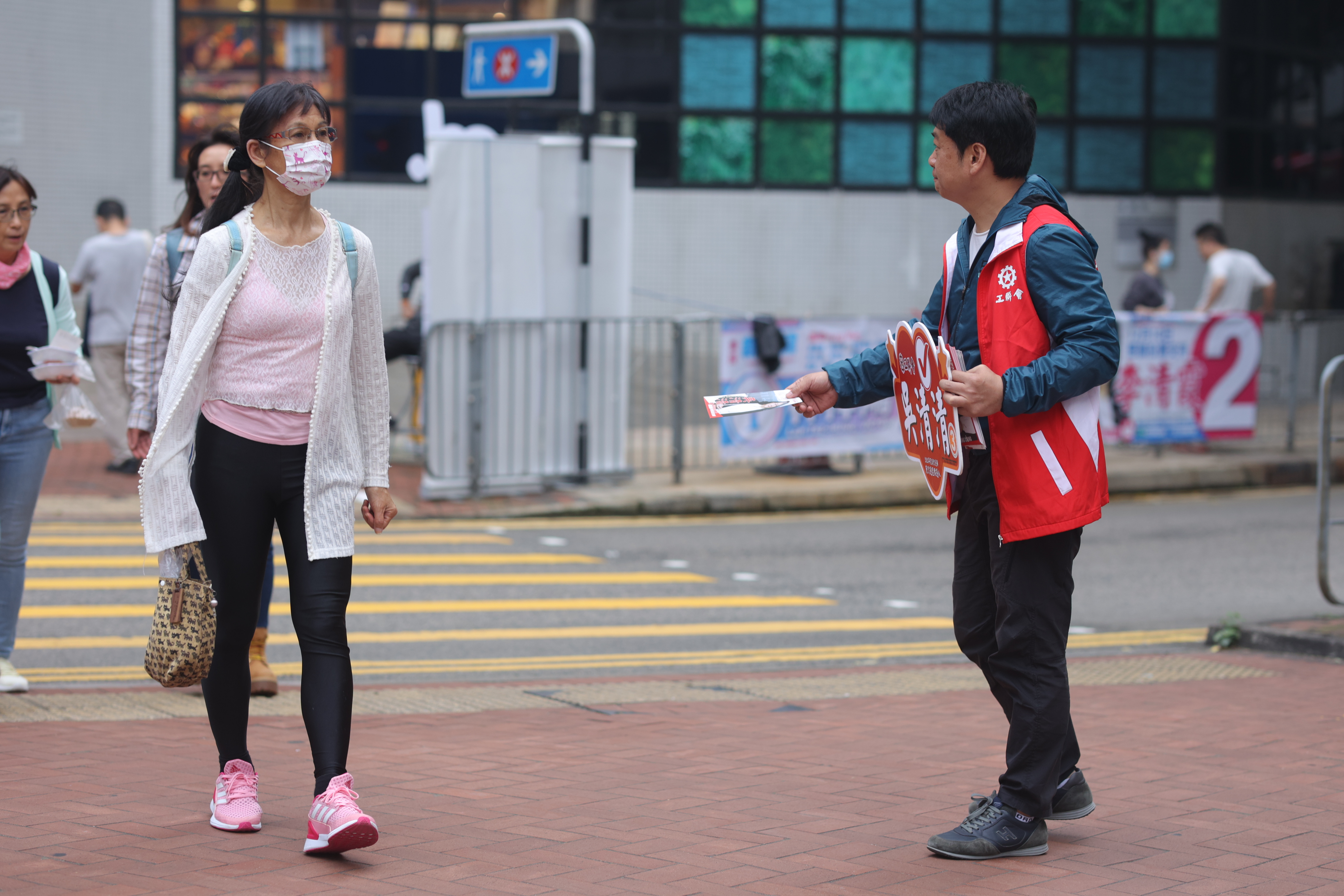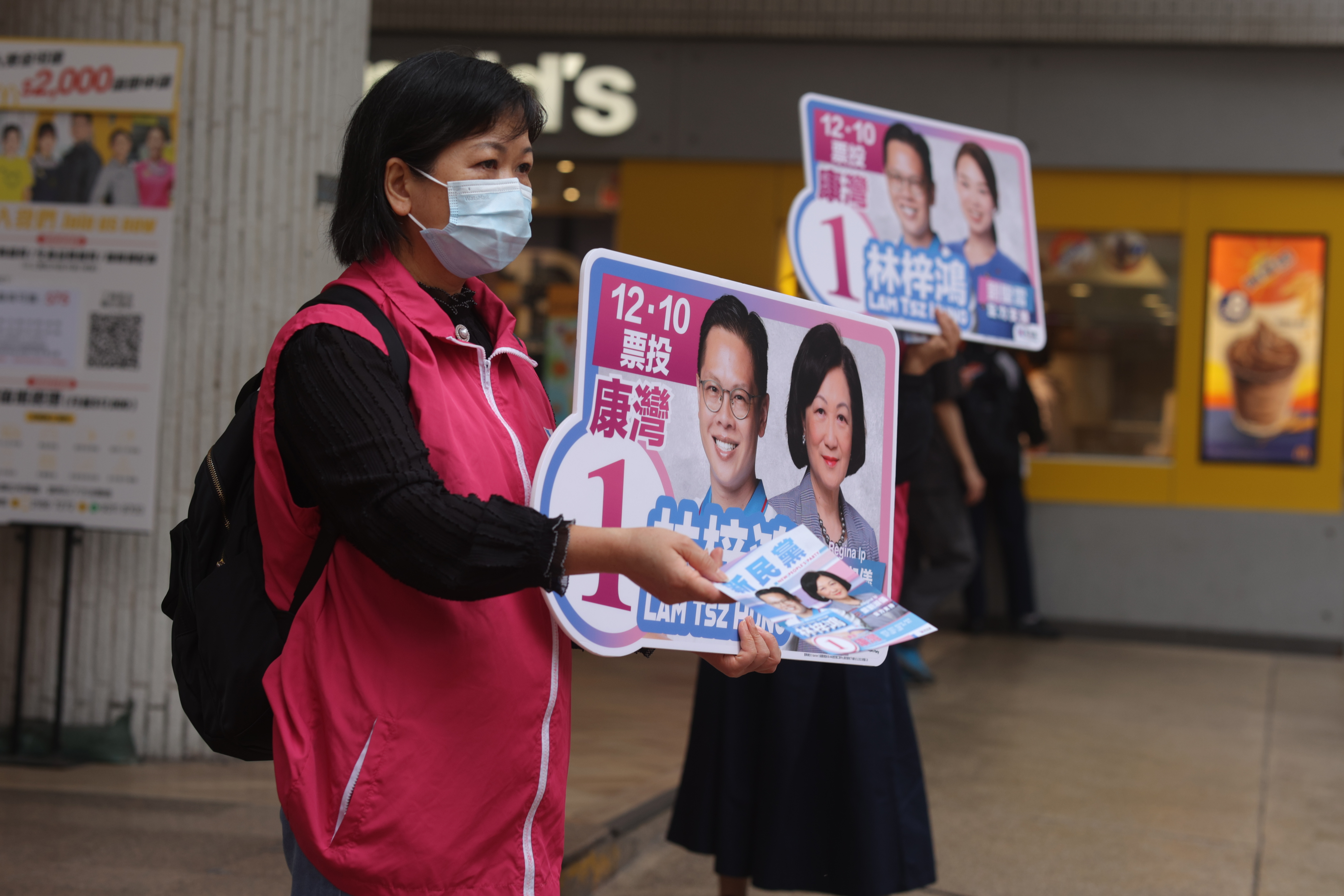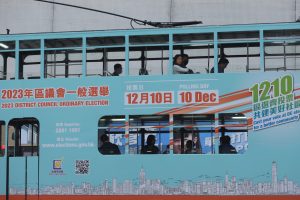My friend points across the busy Hong Kong street. “It’s not like it used to be,” he says of the scene outside the North Point exit of the mass transit system. “Before, when we had elections, you’d see lots and lots of banners” for the competing political parties. Today, just four flags for the local races are lashed to the railings along King’s Road. A pro-China party worker in a red vest finds few takers among commuters for leaflets touting the officially vetted candidates.
Hong Kong has never been a democracy, but it had many of the trappings: free speech, judicial independence, and limited elections. Whereas, once, anyone could vie for office, now the powers that be – China operating behind the scenes – decide who gets a chance, and this gives the pretense of democratic rule over Hong Kong. It is one of many signs that what’s happening here is a cautionary tale for the next objective of China’s expansionary vision: Taiwan.
Officials tout Hong Kong’s “stability and prosperity,” but people decry, along with the democratic deficit, economic troubles, a sinking property market, weakening judiciary, rising crime rates, mass emigration, administrative mismanagement, compromised meritocracy, security crackdown fears, overzealous “patriotic” education, and the loss of media freedom. These make the “distant mirror” of what “unification” with China might mean for Taiwan look increasingly unappealing.
“Hong Kong does not have any opposition politicians right now, no free press, no civil society organizations, and no student associations. Everything has been wiped out and been flattened, and no dissidents are allowed to speak up and people are under arrest, many leaders are still in jail… or in exile,” said National Taiwan University Professor Ho Ming-sho, author of a book on Hong Kong social movements. “…Instead of moving forward toward democracy, we see backsliding to the level of mainland China. It’s very worrying,” according to Ho.
Describing Taiwan’s democracy as an “existential threat” to China’s system, he said the idea of a peace agreement with China is “totally ridiculous because looking at what happened in Hong Kong, we see that Beijing leaders are not going to keep a promise. Any agreement is … a useless document… they can revise as they see fit.”

A canvasser hands out political ads for a candidate in Hong Kong’s District Council elections. Photo by Neal Robbins.
Coming back to Hong Kong after 30 years, I found it as crowded and fast-paced as ever, while visible signs of Chinese rule come from the omnipresent billboard homages to the “74th anniversary” of the Chinese Communist Party. When I was first in Hong Kong as foreign correspondent in the early 1980s, people wondered if ultra-egalitarian China would “kill the goose that laid the golden egg” when it took over from Britain in 1997. Now, the goose killing grows out of Beijing’s own shift to hard authoritarianism.
Attempts to pin down Hong Kong with limits on suffrage and harsh extradition laws led to pro-democracy protests in 2014 and 2019, and the Chinese response grew from fears in Beijing that the Hong Kong uprisings would spill over. China intervened definitively in 2020, imposing wide-ranging restrictions spelled out in the National Security Law. It “fixed” elections to assure approved candidates held a majority and it outlawed any action – or even any speech – seen as undermining government authority, including advocating independence, terrorism, collusion with foreign forces (all of which are vaguely defined). Enforced with stiff jail terms for violations, the law led to hundreds of arrests and jailings.
Among other consequences, the National Security Law makes it illegal for anyone in Hong Kong to even talk to a foreign journalist (which could be deemed “colluding” with foreign forces). Through intermediaries I contacted in advance a dozen Hong Kongers who might represent public opinion, but with “everything to lose and nothing to gain” by speaking out, as I was told by one source who would go on record, they demurred.
Knowing that I was unlikely to be able to meet freely with sources – or even average people – before going to Hong Kong, I interviewed exiled activists who could speak openly in the United Kingdom and Taiwan to gather, at least, the unfettered opposition view.
In Taiwan, I spoke to Chan Kin-man, an architect of the 2014 Umbrella Movement, who called China’s 1984 “one country, two systems” pledge for Hong Kong autonomy “bankrupt.” Having spent 16 months in a Hong Kong jail for his role in the protests, Chan, now a National Chengchi University sociologist, had unequivocal advice for Taiwan: “Take a lesson from Hong Kong. Don’t trust anything about this promise.”
His words were echoed by former Democratic Party Chairman Lee Wing-tat, who left Hong Kong for the U.K. when he was tipped off that his arrest was imminent. The Sino-British joint declaration – under which China pledged to leave Hong Kong’s unique social and economic systems untouched for 50 years – “is useless now,” Lee lamented. “When the circumstances change, when we [the Chinese Communist Party] don’t need your help, then we change… I tell Taiwan brothers and sisters: Don’t believe what the Chinese Communist Party says.”
In Hong Kong, I managed to speak to some locals privately, but few of the independent politicians – those not in jail, abroad, or out of politics – still speak out. Emily Lau, a seven-term Democratic Party legislator who retired in 2016, is an exception. She said local journalists don’t dare talk to her.
“I don’t think I would say that the freedom of expression in Hong Kong is zero, but many people will tell you that they are worried… Nobody knows, that’s the problem with… the National Security Law,” she explained. It’s “not just me,” Lau continued, “businesspeople, the Chambers of Commerce, professional people, politicians, they all say the lines are not clear.… You don’t know when you’ve overstepped.” In this “pressure cooker” environment, she said, people are “self-censoring” to avoid getting in trouble.
As for Taiwan, Lau offered her “pragmatic” view, suggesting Taiwan’s future could differ from Hong Kong. “China offers something more to Taiwan. They said Taiwan can keep the military,” so any deal would depend on “what bargaining power you have… If [Taiwan people] just don’t even want to talk, if they just want the status quo, [if they say] don’t touch us… we don’t want to be reunited… They will have to find a way to tell China and hope China will not attack them.”
The bargain Hong Kong struck for “one country, two systems” is not what they have had since at least 2019, Lau argued. “Many people would say that almost all the big decisions taken here have been done with the approval of Beijing.” No pro-democracy party candidates were approved to run for office in the December 10 District Council elections, and that has Lau worried.
“The government is… living in its own cocoon with everybody saying, ‘We are doing great,’” said Lau. Without an opposition, “I don’t think you’ll get good governance.”

A canvasser hands out political ads for a candidate in Hong Kong’s District Council elections. Photo by Neal Robbins.
Hong Kong legislator and pro-Beijing Executive Council member Ronny Tong is less convinced that democracy matters. “China today doesn’t have democracy, but I think the quality of governance is not bad.” He argued that the pro-democracy protests in 2019 had “absolutely nothing to do with democracy. “Rioters” encouraged by “outside political forces” fostered “anarchy,” he said.
Calls from Lau and others for an independent inquiry to determine the truth of these charges, and investigate the alleged role of agents provocateurs and gangsters in the pay of China, have been ignored.
The 2019 protests began with opposition to the extradition law that the Hong Kong government wanted to pass, which would have allowed Hong Kongers to be tried and jailed in China, but the protests soon encompassed broader calls for more democracy. The crackdown had an immediate rebound in Taiwan, coming just before the 2020 presidential elections there. President Tsai Ing-wen, fighting for her second term, spoke out in support of the Hong Kong demonstrations.
According to Tong, the promises made by Beijing before the handover are misunderstood. Hong Kong can only expect higher autonomy compared to other Chinese cities, he said, not “absolute” autonomy. It must rely on “dialogue and consensus building” with Beijing.
As to the security law, he said no one has been prosecuted for what they said or believe, but for crimes. Any “self-censorship” now is just people being “extra careful… there are no restrictions on free speech, none at all,” he said. “This is a compromise, it is the best of all worlds” in that Hong Kong has “returned to the motherland, but at the same time we enjoy more freedom than people on the mainland.”
For Tong, the model may be “a good start for Taiwan.”
That model is pretty harsh. The electoral system is controlled by China-appointed “patriots,” while opposition-led primaries in 2020 resulted in the jailing of 47 candidates. Candlelight vigils for the 1989 Tiananmen massacre are banned, and civil society groups – including labor unions – have been disbanded. Patriotic education has brought sanitized history textbooks and requirements to report breaches of security regulations.
The news media has been devastated. The Hong Kong Free Press, the only remaining independent local English-language publication, does its best to cover the news, but no one knows, said editor Tom Grundy, “what stories are being self-censored and will never emerge.”
For Taiwan, above all, the silence is deafening.

































